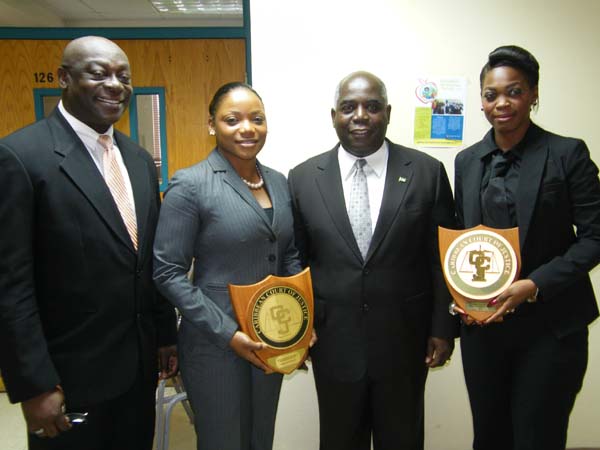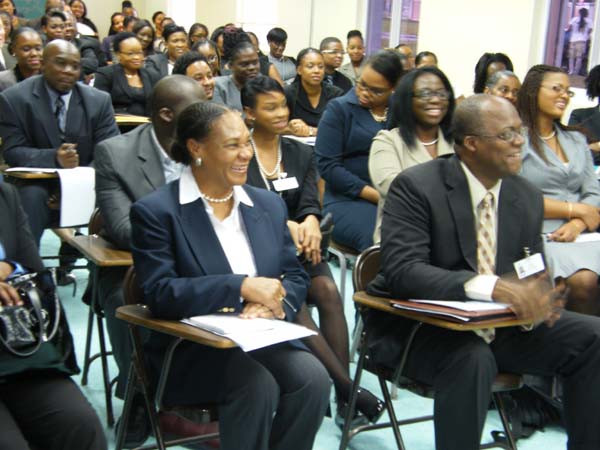DPM Davis delivers experienced advice to country’s aspiring lawyers this week

Nassau, The Bahamas – Deputy Prime Minister and Minister of Works and Urban Development the Hon. Philip Brave Davis admonished students of the Eugene Dupuch Law School to be true to their calling. “To be true to your calling, you cannot casually abrogate your responsibility. The law is a wonderful calling but it is more than a simple means of making a living,” he said.
Mr. Davis addressed the orientation exercise for first and second year students on the topic “The Attorney at Law: A Servant of the People” at the School of Hospitality on Wednesday, September 18.
Providing an illustration, Mr. Davis said a person who seeks to become a pastor must be about serving the whole man or he/she is not being true to the calling. “If it just about the pulpit, then they are in the entertainment business. Entertainment is certainly not bad, but it is certainly misleading to someone who needs to come to a pastor for help only to have a fleeting feel good moment,” he said.
“The same applies to you in the law. If all you do is sell your talent to the highest bidder with no reference to the underlying principle of the law, which is justice, the same justice referred to in the Biblical stories, then you are not being true to the calling; rather, you would have been guilty of abusing the profession.”
The students were told that their job is to offer the best service in protecting their interests and leave judgment to the court. “Every citizen is entitled to legal representation,” said Minister Davis who is also a practitioner. “This means that sometimes your client will be someone who is subsequently judged to have been guilty of criminal acts.”
He urged them to respect the rights of citizens to true representation and always give of their very best. To do less, is to commit a crime of accepting payment and giving them less than agreed upon, which equates to stealing.
“You know stealing is against the law for which you could, in ordinary circumstances, face jail time. You are at the next stage in your lives where you begin, in earnest, the transition from student to practicing professional,” Minister Davis added.
He recalled that as a law student/articled clerk, he viewed the law as something mystical. However, after becoming a member of parliament, he fully appreciated that most laws are created by generally well-intentioned men and women, who hope to craft something, which would serve to assist people in their lives.
“The law is like anything else in life, imperfect but essentially designed for good,” he said.
Despite their entitlement to make a “good” living, the law students were encouraged to aspire to the high ideals of the practice of the law.
“I know that this is an over-used and abused term, but you must strive to practice your law as a true ‘servant of the people’. This is what will bring honour to your practice as an attorney-at-law. This is the nobility of our profession,” the Minister added.
Below is a full text of the DPM Davis presentation to law students:
REMARKS BY
HON. PHILIP BRAVE DAVIS, MP
DEPUTY PRIME MINISTER
AT
THE ORIENTATION EXERCISES
FOR FIRST AND SECOND YEAR STUDENTS
AT
THE EUGENE DUPUCH LAW SCHOOL
THE SCHOOL OF HOSPITALITY, THOMPSON BLVD.
“THE ATTORNEY-AT-LAW: A SERVANT OF THE PEOPLE”
18th September 2013 – 9AM
(Greetings)
Some of you are about to enter the second and final year of your studies at the Eugene Dupuch Law School; some are in the process of beginning a two-year trek.
The title of this talk would appear, to some, to be a novel concept. I hope to assist in dispelling this view.
First of all we might appreciate the difference between “the Law” and “the Lawyer”.
I know that some think that they are indistinguishable. But, if the Holy Bible is any reference of value you might note that beginning in the first Book of the Old Testament, Genesis, through to First John in the New Testament, the word ‘law’ appears almost seven hundred times;whereas, the word ‘lawyer’ does not make an appearance until the Gospels and then fewer that a dozen times.
It would seem that the inspired writers of the Bible considered ‘the law’ of great value and ‘the lawyer’ of somewhat lesser importance.
It is for this reason, if no other, that we should practice humility.
We, like every other citizen, are not above the law.
In our everyday lives, we citizens, are subject to the law. At the same time, we are all obliged to correct bad law.
Frequently, we pose the question directly to ourselves and ask what can I, one lone person, do? The answer always is: “your very best”!
Whereas, you are responsible for the conclusion of an effort, the conclusion must always be as a result of your very best effort.
We choose to pursue professions for myriad reasons. Most of these are readily classified as noble.
We want to prepare ourselves to help others; or, to be productive in society; or, to achieve our personal potential.
Whichever of these drives you, you should recognise that your efforts to date have begun to prepare you to play a potentially meaningful role in your community. You are the ones who will determine the quality of what you do. If you choose to develop your talent to its highest potential then you will benefit society by your efforts to simply to make a living.
You might also take seriously the concept of the Attorney-at-Law as a ‘servant of the People’.
Though I am the first to admit, this is a rather overused and even abused term. The politician who practices demagoguery always paints a picture of him- or her-self as the paramount ‘servant of the people’ even as he or she goes about the process of systematically denying citizens even their basic rights.
Take, for example, the history of Europe and Asia during the middle of the last century when demagogues came to the forefront; dictators with names like Hitler, Stalin, Franco, Mussolini, Kim, Sukarno, to name but a few.
They all sold themselves as ‘saviours’ of the state and of the people. They all promised to solve all problems but were really only about establishing absolute control of the people.
For all of what we might say about political leaders in our country, we have to recognise that ultimately real power remained with the people through the ballot box.
The ruling UBP oligarchy was brought down by the vote of the people in The Bahamas in 1967 even though many thought them so entrenched as to suggest that those opposed to them were unrealistic in their attempt.
But, what those naysayers did not understand was that the young men and women arrayed against the minority rulers during the 1950’s were empowered by an appreciation of a set of principles which were based on teachings most evident in the first ten chapters of the Old Testament Book of Genesis and in the teaching of love and responsibility as offered by Jesus Christ in the Gospels and so eloquently described in Matthew 25: 31- 46.
I invite you to read and ponder these teachings as part of your ongoing preparation.
We Anglicans refer to these as the ‘Social Gospels; Roman Catholics, over the centuries have developed a compendium of studies and teachings which they describe as ‘Catholic Social Teaching’; the Methodist are actively engaged in promoting cooperation between victim, perpetrators and the courts, a practical effort at ‘Restorative Justice’; so many other denominations offer programmes to fulfill the admonition in the gospel of Matthew mentioned earlier; to hungry; clothe the naked; and comfort the weary.
Those engaged in concerted efforts to protect the environment are also part and parcel of this all-encompassing effort to provide for and to protect people.
I suggest that, in your role as ‘Servant of the People’, you are bound to find how you could further enhance this effort. To be true to your calling, you cannot casually abrogate your responsibility. The law is a wonderful calling but it is more than a simple means of making a living. He or she who seeks to become a pastor in a Church cannot just be about the pulpit and preaching.
They must be about serving the whole man or they are not being true to the calling.
If it just about the pulpit, then they are in the entertainment business. Entertainment is certainly not bad, but it is certainly misleading to someone who needs to come to A pastor for help – only to have a fleeting feel good moment.
The same applies to you in the law. If all you do is sell your talent to the highest bidder with no reference to the underlying principle of the law which is justice, the same justice referred to in the Biblical stories, then you are not being true to the calling; rather, you would have been guilty of abusing the profession.
This is not to say that you are to judge your clients. No, no.
Your job is to offer the best service in protecting his or her interest and leave the judging to the court. Every citizen is entitled to legal representation. This means that sometimes your client will be someone who is subsequently judged to have been guilty of criminal acts.
Therefore, you must take this injunction seriously and respect the rights of citizens to true representation and always give of your very best in their interest. To do less is to commit a crime yourself the crime of accepting payment, payment for one thing which is your very best in their interest and giving them less than agreed upon, which equates to stealing.
And you know stealing is against the law for which you could, in ordinary circumstances, face jail time. You are at the next stage in your lives where you begin, in earnest, the transition from student to practicing professional.
You are members of a noble profession; even though a frequently misunderstood one by laypersons.
It is easy for anyone to stand before you and pontificate; but, you will see through the fraudulent quite quickly as you would have been trained, during the purely academic stage of your studies, to see beyond the obvious in the presentation of an argument.
I, therefore, speak to you from my personal perspective as a practitioner before the bar for four decades and one who continues to love and to learn the law.
For the past twenty years I have, concurrent with my practice of law, also been involved in the creation of law as a legislator.
Before I was called to the Bar, while I was a law student, an articled clerk, I had a view of the law as something almost mystical.
After I became a Member of Parliament, I became intimately involved in the creation of law and fully appreciated that most laws are created by generally well-intentioned men and women, who hope to craft something, which would serve to assist people in their lives.
I also recall a political friend once saying to me that people should be happy when Members of Parliament were actively engaged in debate since as long as they were talking, they were not voting and creating new laws. He suggested that all law was crafted to, as he said, ‘take something away from citizens’ while being presented as giving a boon to those in need. While I appreciate his point of view, I don’t fully agree with him.
The law is like anything else in life, imperfect but essentially designed for good.
There are many who make their living in the law: from the legislator who makes the law; to the policeman who enforces the law; to the accused; to we who advise and defend them; to the judge and jury who determine guilt or innocence; to the prison superintendent responsible for the incarceration and rehabilitation of those found guilty and sentenced to a term in prison; and, yes, to those who seek to assist in the reintegration of the former inmate back into the community in order to become a productive member of society.
I mention all of this because it is essential that you determine what kind of role you are going to play in the law.
You are at the point where you have had the benefit of your professors’ suggestions of a predisposition to certain aspects of the law; your parents, your friends and your colleagues have described their views; you certainly have essentially determined which direction you plan to take.
Beside your studies in the law you have lived in communities and most certainly have been impacted by activities in that society.
You may have been involved in a faith community; you would have been involved in debating societies, formal or otherwise; you would have frequented entertainment facilities; in short, you have had the opportunity to appreciate other cultures which will serve you well in appreciating the need to always be careful to understand the social and cultural background of future clients and those opposed in litigation.
Too often, we believe that we are the centre of the Universe and everything revolves around our needs and our values.
Well, the truth is that, to the rest of the world, we, that is to say The Bahamas, are primarily either a tourist destination or a legal jurisdiction for the financial services sector.
When others from the outside interact with us, this is what they see at first glance. It is only when they get to spend time with us that they begin to appreciate, as we all do, that we are so much more.
Because of your profession, you are more likely to come into intimate contact with important people from other societies more often than most of your fellow citizens.
The impression they get from you will most likely colour their overall impression of our country. You, therefore, have decided to take on a large responsibility for the future of your country.
And, how do you do this?
Some folks have gone into the law because they have heard stories of great wealth being achieved. This is the same view that encouraged some others to go into certain branches of medicine or accounting or other professions known for the movement of large amounts of money. This is the ‘business’ side of a profession.
Don’t get me wrong; there is nothing wrong with making money, nothing at all.
But making money is just business. There is also the practice of the law. There is a difference between the business of the law and the practice of the law. You must never allow one to completely subsume the other.
You are entitled to make a living, and as good a living as your talents and efforts will permit, but you should always live up to the high ideals of the practice of the law as those who drew you to the profession.
I know that this is an over-used and abused term, but you must strive to practice your law as a true ‘servant of the people’. This is what will bring honour to your practice as an attorney-at-law. This is the nobility of our profession.
As you were growing up, you would have heard from your parents, your teachers and your pastors suggestions that there was great value in ‘doing unto others as you would have them do unto you.’ This is not idle thought. If you make it the linchpin of your practice you will find that yours will be a practice of integrity.
This will serve you well in all that you do. You will be challenged in this effort. At each step of the way in your career you will find opportunity to choose whether you will actively be involved as a protector and defender of the rights of citizens or if you will participate in attacks against the intrinsic rights of people.
The values which have been inculcated in you by how you were raised will greatly impact which route you follow. There is great benefit in appreciating your tendencies before finally deciding the route you will take in your career. After all, the quality of what you craft in your life’s calling will depend, to a great extent, on the passion with which you approach the work.
It is often said that, in almost any project, passion is more valued than experience. Passion is not something you develop; it is developed by circumstances of your life and your ongoing interests. It will take personal discipline to follow your passion.
Others will not necessarily understand why you would choose certain subsets of law over more lucrative or public practice.
Speaking of ‘practice’, the term relates to the reality that you never finish learning the law – It is a lifetime process.
With each new question, brought to you by a client, you will find yourselves hitting the books as a means of ensuring that your client receives the benefit of thorough research and therefore an opinion based on the latest legal information.
You could, just as easily, choose to take the easy route but this will eventually tell – how well your clients find they are faring as a result of your lack of effort.
They won’t be quiet. As you know, reputation is the single most important aspect of public reference. In your practice you will frequently find yourself able to help the process of protecting the people by being a buffer between demagogues in the public sector and citizens.
This often comes as pro bono work without direct remuneration and, yes, it comes with the territory. Some attorneys forget this, but I trust that you will not be among them.
This pro bono work takes many forms including assisting the indigent in a matter of difference with authorities or pointing out the faults inherent in either legislation or policies which, if left unchecked, could lead to abuse against the weaker members of the community.
For some, practitioners of the pro bono work becomes their life’s focus with commercial aspects of the law serving as a means of ‘paying the bills’ while serving those in need but without means to pay for legal services.
This same view is what calls men and women to other professions of services to the dispossessed in society- religious and the like.
I trust that I have been able to suggest that you are entering a field that many consider privileged and that, while you will have earned the right to participate on completion of your studies at the Eugene Dupuch Law School, you maintain the right to respect within the profession by how you carry yourself and how you conduct the practice of the law.
May you all go on to make all of us who support you exceedingly proud to know you.
Thank you and good morning.
——END——








